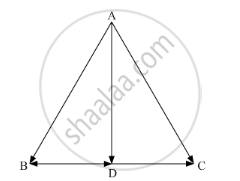Advertisements
Advertisements
प्रश्न
The two vectors `hatj+hatk " and " 3hati-hatj+4hatk` represent the two sides AB and AC, respectively of a ∆ABC. Find the length of the median through A
उत्तर
In ∆ABC,

Using the triangle law of vector addition, we have
`vec(BC)=vec(AC)-vec(AB)`
`=(3hati-hatj+4hatk)-(hatj+hatk)`
`=3hati-2hatj+3hatk`
`:.vec(BD)=1/2vec(BC)=3/2hati-hatj+3/2hatk " (Since AD is the median)"`
In ∆ABD, using the triangle law of vector addition, we have
`vec(AD)=vec(AB)+vec(BD)`
`=(hatj+hatk)+(3/2hati-hatj+3/2hatk)`
`=3/2hati+0hatj+5/2hatk`
`:.AD=sqrt((3/2)^2+0^2+(5/2)^2)=1/2sqrt34`
Hence, the length of the median through A is `1/2sqrt34`units.
APPEARS IN
संबंधित प्रश्न
Let \[\vec{a,} \vec{b,} \vec{c,} \vec{d}\] be the position vectors of the four distinct points A, B, C, D. If \[\vec{b} - \vec{a} = \vec{c} - \vec{d}\], then show that ABCD is a parallelogram.
If \[\vec{a,} \vec{b}\] are the position vectors of A, B respectively, find the position vector of a point C in AB produced such that AC = 3 AB and that a point D in BA produced such that BD = 2BA.
If the position vector of a point (−4, −3) be \[\vec{a,}\] find \[\left| \vec{a} \right|\]
Find the coordinates of the tip of the position vector which is equivalent to \[\vec{A} B\], where the coordinates of A and B are (−1, 3) and (−2, 1) respectively.
If the position vectors of the points A (3, 4), B (5, −6) and C (4, −1) are \[\vec{a,}\] \[\vec{b,}\] \[\vec{c}\] respectively, compute \[\vec{a} + 2 \vec{b} - 3 \vec{c}\].
If \[\vec{a}\] be the position vector whose tip is (5, −3), find the coordinates of a point B such that \[\overrightarrow{AB} =\] \[\vec{a}\], the coordinates of A being (4, −1).
If the vertices of a triangle are the points with position vectors \[a_1 \hat{i} + a_2 \hat{j} + a_3 \hat{k} , b_1 \hat{i} + b_2 \hat{j} + b_3 \hat{k} , c_1 \hat{i} + c_2 \hat{j} + c_3 \hat{k} ,\]
what are the vectors determined by its sides? Find the length of these vectors.
Find the position vector of a point R which divides the line segment joining points \[P \left( \hat{i} + 2 \hat{j} + \hat{k} \right) \text{ and Q }\left( - \hat{i} + \hat{j} + \hat{k} \right)\] internally 2:1.
Find the position vector of the mid-point of the vector joining the points P (2, 3, 4) and Q(4, 1, −2).
Show that the points A, B, C with position vectors \[\vec{a} - 2 \vec{b} + 3 \vec{c} , 2 \vec{a} + 3 \vec{b} - 4 \vec{c}\] and \[- 7 \vec{b} + 10 \vec{c}\] are collinear.
Prove that the points having position vectors \[\hat{i} + 2 \hat{j} + 3 \hat{k} , 3 \hat{i} + 4 \hat{j} + 7 \hat{k} , - 3 \hat{i} - 2 \hat{i} - 5 \hat{k}\] are collinear.
If the points with position vectors \[10 \hat{i} + 3 \hat{j} , 12 \hat{i} - 5 \hat{j}\text{ and a }\hat{i} + 11 \hat{j}\] are collinear, find the value of a.
If the points A(m, −1), B(2, 1) and C(4, 5) are collinear, find the value of m.
Show that the points whose position vectors are as given below are collinear: \[3 \hat{i} - 2 \hat{j} + 4 \hat{k}, \hat{i} + \hat{j} + \hat{k}\text{ and }- \hat{i} + 4 \hat{j} - 2 \hat{k}\]
Show that the four points having position vectors
\[6 \hat{i} - 7 \hat{j} , 16 \hat{i} - 19 \hat{j} - 4 \hat{k} , 3 \hat{j} - 6 \hat{k} , 2 \hat{i} - 5 \hat{j} + 10 \hat{k}\] are coplanar.
Show that the four points A, B, C and D with position vectors \[\vec{a}\], \[\vec{b}\], \[\vec{c}\], \[\vec{d}\] respectively are coplanar if and only if \[3 \vec{a} - 2 \vec{b} + \vec{c} - 2 \vec{d} = \vec{0} .\]
If \[\vec{a}\], \[\vec{b}\], \[\vec{c}\] are position vectors of the points A, B and C respectively, write the value of \[\overrightarrow{AB} + \overrightarrow{BC} + \overrightarrow{AC} .\]
If D is the mid-point of side BC of a triangle ABC such that \[\overrightarrow{AB} + \overrightarrow{AC} = \lambda \overrightarrow{AD} ,\] write the value of λ.
Find the image P' of the point P having position vector `hati+ 3hatj+ 4hatk` in the plane `vecr. (2hati - hatj + hatk) + 3 = 0 .` Hence find the length of PP'.
Find the position vector of the point which divides the join of points with position vectors `vec"a" + 3vec"b" and vec"a"- vec"b"` internally in the ratio 1 : 3.
X and Y are two points with position vectors `3vec("a") + vec("b")` and `vec("a")-3vec("b")`respectively. Write the position vector of a point Z which divides the line segment XY in the ratio 2 : 1 externally.
Find the value of x such that the four-point with position vectors,
`"A"(3hat"i"+2hat"j"+hat"k"),"B" (4hat"i"+"x"hat"j"+5hat"k"),"c" (4hat"i"+2hat"j"-2hat"k")`and`"D"(6hat"i"+5hat"j"-hat"k")`are coplaner.
Find the position vector of a point R which divides the line joining the two points P and Q with position vectors `vec"OP" = 2vec"a" + vec"b"` and `vec"OQ" = vec"a" - 2vec"b"`, respectively, in the ratio 1:2 internally
Position vector of the mid-point of line segment AB is `3hati + 2hatj - 3hatk`. If position vector of the point A is `2hati + 3hatj - 4hatk`, then position vector of the point B is ______.
